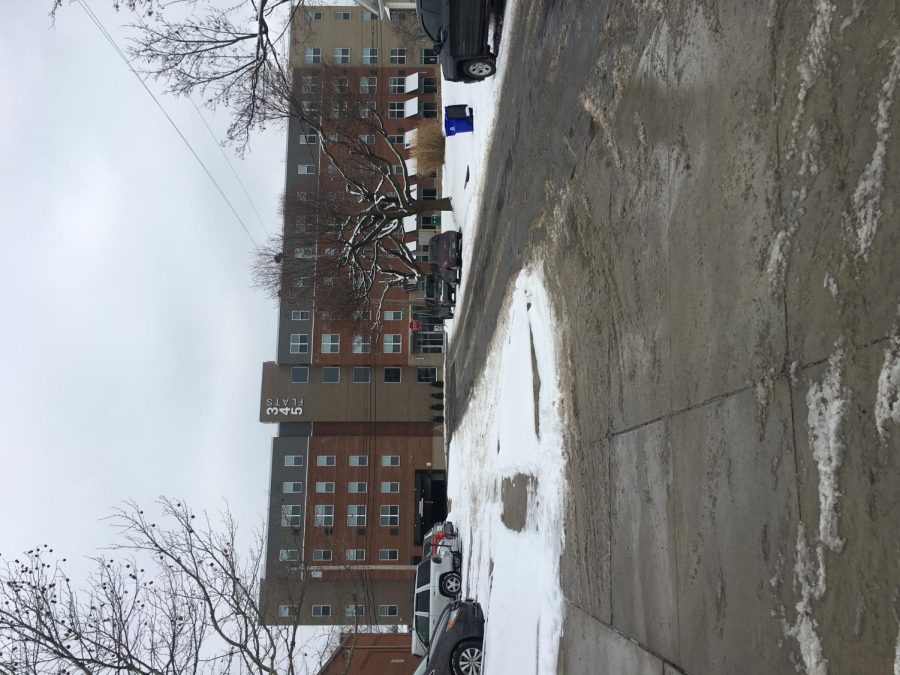Students deal with increase in utility costs during winter months
Plenty of Kent State students choose to reside in apartments nearby campus, since the university only requires students to remain on campus for their freshman and sophomore years. However, students have learned that staying warm will cost them.
How rent and electricity are billed
Eric Gros, a junior political science major, is a resident of the downtown Kent complex 345 Flats. Gros moved into the apartment complex at the beginning of this academic year. At 345 Flats, electricity is contracted out, and residents must pay an electric bill that is separate from their monthly rent.
“When I moved in, they said that on average we would spend about $30 for all months,” Gros said. “They warned that winter could be a little bit higher, but when we got these last couple bills it was just insane.”
At the Province, rent and electricity are two separate bills, said senior middle childhood education major Kayla Blackerby, who lived there during her junior year.
Both the Province and University Edge follow a similar format in billing rent and electricity by dividing the costs between the roommates of an apartment.
At University Edge, however, electric is included with utilities, and residents receive a $30 credit toward their bill. If residents exceed this allowance, then they are charged an additional fee.
“We explain how electricity and utilities work on tours and when the lease is signed,” Lea Zaitzew, a University Edge employee said.
Joona Lee is a sophomore nursing major at Kent State, and she moved into University Edge in August of this past year. “We didn’t think it would be a problem,” Lee said of the extensive electricity fees.
Gros said that he and his roommates started to notice an increase in their electricity bill starting in November. Considering that November is when Ohio flips the switch to winter weather, a slightly higher bill is to be expected. What Gros and his roommates got, however, was much higher than anticipated.
“Going into November it jumped up to almost $42, and we were confused as to what happened. Going into December, it was $62 per person. Even when none of us were there for Thanksgiving or all of Christmas break, it was still almost our highest one,” Gros said.
Blackerby saw a spike in the bill as soon as her and her roommates started using heat.
“The electric bill was usually only $15 for each of us. But then come winter the heat ran off of electric, so the more heat, the higher the bill. We would each pay $40 to $50 during the winter months,” she said.
How to keep the electricity bill down
Brittany Mullen is the property manager for 345 Flats. While residents tend to be blindsided by the increasing electric bills, Mullen stressed that all students are made aware of the way electricity in the apartment works when the lease is signed and during tours. Mullen said that the average price of electricity is different from apartment to apartment and that the bill depends largely on individual usage.
“Fluctuating the thermostat can really cause an increase in the bill,” Mullen said. “Occupants tend to think that by turning the heat off when they leave, they will save money. But, it takes more electricity to warm the whole apartment back up then to just leave it at a steady temperature.”
“At one point, 345 Flats sent out an email,” Gros said. “They recommended turning our heat down ten degrees to save 5 percent on our electricity bill. Our apartment would be at 56 degrees then, it just seemed ridiculous.”
Some residents look for alternative methods to stay warm.
“We put extra blankets out around the apartment,” Blackerby said. “I liked to just turn the heat up and be comfortable, but my roommates were more concerned with saving money.”
How apartment complexes handle frustrated students
Blackerby liked to keep her apartment between 71 or 72 degrees.
Patty McNerney, the community manager at the Province, said students are made aware of the electricity situation when they sign their lease.
McNerney said that an average electricity cost is “impossible to gauge” because of the different styles of apartments available.
Blackerby said that the Province office was helpful in setting up ways for their residents to pay bills. “They were helpful by making the process to pay easy, or you could set it (paying) up automatically. But if you wanted to negotiate price, it was a no.”
Lee said that she and her roommates try to keep the apartment heated to about 71 degrees. She said that this month’s rent marks the fourth time that her and her roommates have exceeded the $30 allowance.
While apartments tend to do what they can to keep their residents happy, it looks as though staying warm is something that college students need to budget for.
“It’s frustrating,” Lee said, “but we get it.”
Natalie Eusebio is the commuters and apartments reporter. Contact her at [email protected].



